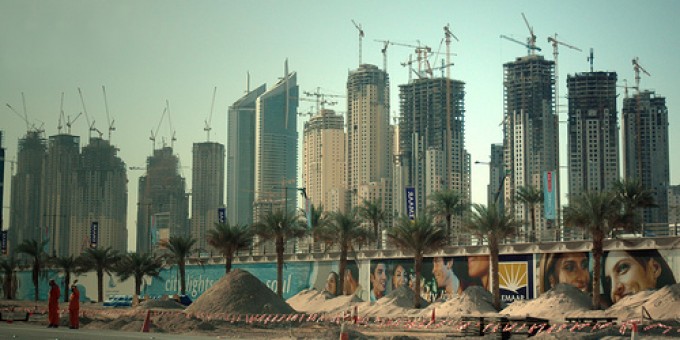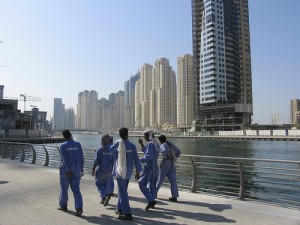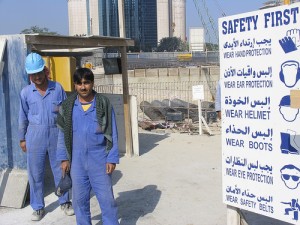
Photo by Jake Brewer
Permanent Impermanence
I was standing on the helipad of a new, swanky highrise apartment building in the Dubai Marina with my friend Vishul in the summer of 2006.
We took in the panoramic, nighttime view of skyscrapers in the making, each capped with cranes lit red and white like so many giant Transformer action figures. Vishul, who’d grown up in Dubai, turned three hundred and sixty degrees and jokingly exclaimed, “This is the future!” And, until the global economic meltdown hit in late 2008, it probably was.
Dubai has been lauded by Western statesmen and the media as a model for the rest of the Muslim world to follow—a capitalist, consumerist paradise tolerant of alternative (read: Western) lifestyles and undisturbed by terrorism. This city of the future is ruled over by a benign autocrat, Sheikh Mohammed bin Rashid Al Maktoum, and is populated mainly by foreigners.
These expatriates, who comprise over ninety percent of the population, account for ninety-nine percent of the private sector workforce and ninety percent of the public sector workforce in jobs ranging from construction workers and maids to engineers, architects, and bankers. Because Dubai has been a migrant-receiving city since the early 1900s, its massive foreign population is nothing new. In fact, even before the United Arab Emirates (of which Dubai is a semi-autonomous member) received independence in 1971, Dubai’s migrant population exceeded its native citizen population. What’s astounding, though, is that all expatriates are in Dubai on short-term visas. Unlike immigrant-receiving countries such as the U.S., U.K., France, and Germany, Dubai has no form of permanent immigrant incorporation. Even in countries as strict as Switzerland, migrants, including lower-skilled “guest workers,” can find roads to permanent settlement and family reunification. So while guest workers and their children throughout Europe may find it varyingly difficult to acquire citizenship, they often have the legal right to stay permanently.In Dubai, expatriates willingly give up political rights such as free speech and due process, and they live precariously on short-term visas that can be revoked at any time for any reason. In exchange, they earn tax-free wages as “economic mercenaries,” fully aware that they are there solely to work. For lower-level workers from developing countries, the trade-off includes the unstated promise that they will live and toil in harsh conditions in Dubai so they can send remittances and make a better life for themselves back home. The middle class, mainly South Asians and Arabs from outside the Arabian Gulf who fill the bulk of lower and middle white-collar positions, find better occupational possibilities, better schools, more comfortable family living, and a largely crime-free environment enticing. And for upper-class professionals (Westerners, but also South Asians, Arabs, and others) there is the lure of the “good life”—comprised of cheap household help (maids alone form ten percent of the population), luxury accommodations, spas, clubs, bars, restaurants, outdoor sports, and prostitution—that has made Dubai so famous in the West.
On its surface, the case of Dubai and its permanently impermanent workforce seems singular. But, as many Western countries implement restrictive guest worker programs that limit immigrants’ ability to stay and circumscribe many of their rights, the case of Dubai’s expatriates may actually be a harbinger of the future of global migration.
A Mercenary Life
All expatriates in Dubai, even those born in Dubai, are on short-term, renewable visas, regulated through the kafala, or sponsorship, system. Expatriates’ residence visas are, as in the rest of the Arabian Gulf countries, tied to their sponsors, usually their employers. Changing jobs is virtually out of the question, and any expatriates who quit or are fired, with some exceptions for professionals, have to leave the country for a six-month period before they can return to take another job. So long as expatriates in Dubai hold on to their jobs and don’t bring negative attention to themselves, though, they can stay until the retirement age of 60, at which point, unless they own a business or receive permission on a case-by-case basis, they must leave.
Not unexpectedly, laborers, the middle class, and professionals experience their temporariness differently. Laborers including construction workers, maids, cab drivers, and lower-level service workers (who generally earn slightly better than third-world level wages) constitute the vast majority of Dubai’s population and are highly regulated in their working and social lives. Their passports are confiscated upon arrival (an illegal practice that even government ministries engage in), their wages are often withheld for months at a time to prevent them from quitting (a practice the government tolerates), and unions and strikes are illegal. Workers who have participated in strikes or protests have been immediately deported without a trial or due process of any kind. Many men (especially construction workers) are housed in remote, overcrowded, filthy labor camps, and most of the rest of the working class shares rooms in overcrowded, filthy, and dilapidated villas or apartment buildings. Socially, they fare no better: construction workers, for example, are often denied entry to the shopping malls they build.Where laborers’ lives are largely regulated by this series of “sticks,” the middle class and professionals’ lives are regulated mostly with “carrots” like high salaries, fast professional advancement, and luxury living. The government doesn’t need to enforce discipline, as these expatriates essentially live in a “gilded cage,” willingly trading political rights for economic possibilities. And the government is more than happy to allow these expatriates wide latitude in their social behaviors (they’re free to worship as they like, drink, and openly visit prostitutes, for instance) so long as none of those behaviors looks remotely political.

The transience of expatriates is underscored by the fact that citizenship is basically unattainable and there is no such category as permanent residence. The most commonly stated reasons given by government officials for denying citizenship or permanent residence are the threats of cultural extinction and demographic imbalance posed by the possibility of absorbing so many expatriates into the pool of citizens. These twin arguments are repeated time and time again. However, there are two critical but unstated factors that are central to the management of expatriates in Dubai and the government’s stance on naturalization. First, the government’s legitimacy depends to a great degree on its ability to guarantee a high standard of living to national citizens. Allowing expatriates to naturalize might lead to the state having to spread its welfare largesse among a much larger pool of recipients. Second, the kafala system provides a simple and effective mechanism of social control. As expatriates are in Dubai primarily to work, the mere possibility of deportation is enough to stifle any kind of threat they may pose to the political-economic order.
Many scholars argue that formal, legal citizenship is becoming less important in an increasingly globalized world. As money, goods, ideas, and people move further and faster than ever before, legal and social barriers to movement have weakened. The idea of dual citizenship is more widely accepted than it ever has been, further eroding the historical notion that citizens should have loyalty to only one place. Even illegal migrants can often become legal by proving that they have conducted themselves like “good citizens” in their new land.

But legal citizenship and the realistic possibility of obtaining it remains important—you simply cannot legally and securely live somewhere without a proper visa or citizenship. The non-legal dimensions of citizenship, including the cultural, economic, consumer, and psychological angles, are largely meaningless without formal legal standing. Consider one of the most basic factors of citizenship: generally, you cannot be deported—and if you are deported, the other forms of citizenship become moot. For noncitizens, these other forms of citizenship can only be meaningful if the threat of deportation is minimal.
These are things that expatriates in Dubai, most of whom are from the developing world, understand all too well. While there are no publicly available data on the numbers of deportations, they occur frequently enough that stories of deportees serve as widely-known cautionary tales that help keep laborers, the middle class, and professional expatriates in line. These nonnatives are careful to stay out of trouble with the police, they make certain not to engage in behavior that might look political, and they avoid criticizing the ruling family or national citizens in general. At any point and for practically any reason, the government or an employer may arbitrarily cancel a worker’s visa and trigger immediate deportation.The threat of deportation and the lack of any legal recourse is one reason why so many expatriates would welcome the possibility of naturalization or, at least, permanent residence. Without these possibilities, expatriates understand that their stay in Dubai, no matter how long-term, is by definition temporary. They plan accordingly: Westerners know they will return to the West. Laborers know they will also go back home. South Asian and Arab middle class and professional expatriates must either go home (an undesirable outcome for many) or attempt to go to the West seeking new professional opportunities for themselves or education for their children.
Expatriates born in Dubai also understand that they are temporary residents. Of the forty-five South Asian and Arab second-generation expatriates I interviewed, more than half had acquired permanent residence or citizenship in Western countries, and most of the rest were trying to do the same. Hardly anyone I interviewed intended to return to their legal home in their parents’ third-world country of origin, but few had any illusions of calling Dubai home. I was stunned to hear one young, Indian corporate headhunter say bluntly, “Dubai is a pitstop, a place where you come, make a good amount of money and you get out.” Why was this so shocking? The young man in question had been born and raised in this “pitstop.” Until just before we met, he’d never even been outside the U.A.E.
In response to recent international pressure and spiraling unemployment among national citizens, some Arabian Gulf states have begun to rethink the kafala system. Bahrain was the first to initiate radical change, discarding the sponsorship system altogether in August 2009. Its expatriates will now be “sponsored” directly by the government, and their visas will no longer be tied to a particular job. Following Bahrain, Kuwait took a first step toward abolishing the kafala system when it announced that its expatriates would be able to change jobs after three years without sponsor approval or after one year if the sponsor doesn’t object. Using language that Human Rights Watch would approve of, a Kuwaiti minister lauded the change and called the kafala system “modern-day slavery.”
The abolition of the kafala system could lead to higher wages, especially at the middle and lower ends of the job market, where most workers are from the developing world and paid accordingly. Bahrain and Kuwait also hope that the current high unemployment rates among national citizens will be reduced, as the financial costs of hiring and training nationals become more attractive to private-sector firms. Conspicuously though, officials in Dubai have remained mum on any similar changes. Their silence is deafening—and unsurprising, given that Dubai’s government-owned companies in construction, hospitality, and other sectors employ tens of thousands of workers at all levels, and government coffers are enriched through those depressed wages.These policy changes represent a monumental shift for the region. The basic premise of my research has been that the kafala system colors every aspect of life in Dubai. If similar, radical changes were undertaken in Dubai, the way of life for expatriates and national citizens alike would be drastically altered. Expatriates would have freedom of mobility in the labor market and would no longer have to fear deportation should they lose or quit their jobs. This is a particularly important issue today, as Dubai is in the middle of a recession, with megaprojects at a standstill and many completed highrises standing empty. Workers are being laid off in such large numbers that some estimate Dubai’s population may have shrunk by an incredible seventeen percent in 2009.
The “Dubai Effect”
The story of Dubai’s expatriate population feels, at first, like an outlier. But it may end up being replicated beyond Dubai and the Arabian Gulf countries. While Bahrain and Kuwait are in the process of abandoning the kafala system, Western countries are increasingly adopting labor policies similar to those of Dubai and the other Gulf countries. These policies mainly concern working-class laborers, but as in the Gulf, professionals may find themselves living under similar visa regimes. For example, more than half of skilled workers from non-European Union countries arrive in the U.K. on “intra-company” transfers. As of a 2008 overhaul, the U.K.’s visa system is largely grounded through employers. While Tier 1 visas, issued for highly skilled professional migrants, do not require a sponsor, Tier 2 employees applying for permanent status must be sponsored or they’ll be forced to leave. Further, in 2009, the government was considering banning transferred, “intra-company” workers from citizenship altogether, a move that could conceivably turn them into Dubai-like expatriates: legal, but impermanent.
Similarly, the U.S. has programs limiting the ability of professionals from overseas to stay, most notably the H1B visa program. The H-1B program is mostly for IT professionals, whose visas are tied to their employers. They can stay up to six years, so long as they are employed, and they are allowed to apply for permanent residency. There is, however, no guarantee that it will be granted; my friend Vishul tried, but failed, to adjust his own H-1B status and had to leave the country. At its peak, the H-1B program covered roughly 200,000 people a year, but the number of these visas being issued yearly has since dropped to its original 1999 level of 65,000.The U.S. has also toyed with the idea of a wide-ranging guest worker program for lower-skilled workers. This would echo the Bracero Program, which brought temporary Mexican agricultural laborers to the U.S. from 1942-1964, but ended in part because of widespread abuse of workers. In 2006, Congress proposed a plan to create a permanent guest worker program that would admit 400,000 more workers a year. While it was not enacted, many in Congress made it clear that when immigration reform is eventually addressed it must include some kind of temporary guest worker program.
Recognizing aspects of the kafala system creeping into national policy debates, the Nobel Prize winning economist Paul Krugman mused on what he called “the Dubai Effect” in The New York Times. Writing in 2006, Krugman said that a guest worker program could amount to a dangerous betrayal of the United States’ democratic ideals. It would, he wrote, basically form an entrenched caste system of temporary workers whose interests would largely be ignored and whose rights would be circumscribed. Further, their wages would undoubtedly be less than those of people with greater labor market mobility, though the ripple effects of a glut of guest workers would be expected to lower wages for all workers in sectors where guest workers are “bonded” to their employers, Dubai-style.
Following Krugman, I wonder if Western states increasingly adopt policies like those in the Arabian Gulf countries, they will see situations of non-assimilation similar to those played out among expatriates in Dubai. Of course, unlike in Dubai, any children born in the U.S. acquire citizenship by birth, but there would still be a sizeable community of adults who were essentially in the country, but not of it. If that’s the case, Dubai and its permanently impermanent population would look less like a unique example and more like a prescient harbinger of the future experience of incorporation—or lack thereof.
Recommended Resources
Human Rights Watch. Building Towers, Cheating Workers: Exploitation of Migrant Construction Workers in the United Arab Emirates (November, 2006). Examines government collusion in employers’ exploitation of workers in the UAE.
Andrzej Kapiszewski. Nationals and Expatriates: Population and Labour Dilemmas of the Gulf Cooperation Council States (Ithaca Press, 2001). Explores how Arabian Gulf countries controlled their expatriate labor force and kept their citizens happy before the latest economic boom.
Aihwa Ong. Flexible Citizenship: The Cultural Logics of Transnationality (Duke University Press, 1999). Details how globalization and transnational behavior have changed the meaning of citizenship.
Yasemin Soysal. Limits of Citizenship: Migrants and Postnational Membership in Europe (University of Chicago Press, 1994). Shows how formal citizenship declines as states, influenced by the global discourse of human rights, increasingly grant rights and benefits to noncitizens.
More from Syed Ali
- A hard edge to Dubai’s glittering allure, The Los Angeles Times, May 14, 2010
- In Dubai, the party’s far from over, The Guardian, March 20, 2010
- ‘You must come with us’, The Guardian, November 12, 2007
- Dubai: Gilded Cage, Yale University Press.
